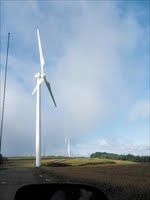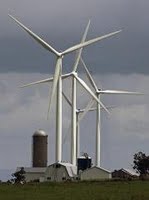 Town to fight wind company lawsuit
Town to fight wind company lawsuit
By Julie Sherwood, Staff Writer, Daily Messenger
A fight over whether a proposed wind turbine project bordering Naples will go forward heated up last week when the developer filed a lawsuit against the town, where 17 turbines were to go up.
The Article 78 action, filed in state Supreme Court in Monroe County by developer Ecogen Wind LLC, seeks to overturn the Town Board’s decision to stop the project by denying approvals and placing a moratorium on its development.
Last month, the board unanimously rejected the proposed wind turbine project, determining the gigantic, power-generating machines would have a negative effect on the environment. The board also imposed a six-month moratorium on wind turbines following a public hearing.
The decision followed a meeting the previous month attended by 116 residents. Most of those who spoke opposed the project over concerns about noise, light flicker, positioning on steep slopes and other concerns.
Supervisor-elect Brad Jones said he and other elected officials are ready to challenge the lawsuit that claims the town acted improperly and illegally in rejecting the project’s application.
“You don’t try to build a big industrial project when 70 to 80 percent said ‘we don’t want
industrialization in the town,’” said Jones. His family, like most others in Italy, choose to live there because of family history and the town’s rural character, he said.
“We need to represent the will of the people,” added Jones. “We will continue to fight.”
Messages left with Nixon Peabody LLP, Ecogen’s legal representative on the case, were not returned. Beth O’Brien, a spokeswoman with Ecogen’s partner on the project, Pattern Energy Group, said she could not comment because of the pending litigation.
Ed Premo, with Harter Secrest & Emery LLP, which represents the town, said the Town Board did due diligence.
“It went through the process of carefully reviewing the application, went through two public hearings and carefully considered all documents and evidence,” he said, before the board determined the benefits Ecogen offered did not outweigh “the substantial adverse impacts of the project.”
Jones said Ecogen had bought several properties in the town, with plans to build turbines there, claiming in the lawsuit it had spent between $10 million and $12 million on those land deals, while pegging its entire cost for the project at more than $150 million.
Town resident Vince Johnson said he plans to ask the town to set up a legal-defense fund to pay for the ongoing costs in fighting Ecogen in court.
“Sadly, Ecogen is coming back to town again with a legal gun and trying to bleed the town dry,” he said.
Italy and Ecogen have been involved in several legal battles involving the turbine project, which is tied to one in neighboring Prattsburgh. Ecogen and Pattern Energy Group want to put up 33 wind turbines across the two towns, with the companies saying the Prattsburgh project depends on getting the permit from Italy.
Naples also has a lot at stake. This summer the Naples Town Board asked the state’s Public Service Commission to stop development of turbines that would be built close to the town line. The town has focused on five turbines that Ecogen’s original plans sited on Knapp Hill in Prattsburgh. One would be within 250 feet of the Naples town line and less than 500 feet from a Naples landowner's property line.
Wind turbines are already towering over the landscape to the south of Naples. Fifty turbines — with most clustered on Pine and Lent hills in Cohocton — installed by another wind energy company, First Wind, became operational early this year. The company’s plans to erect more than 40 additional turbines for a project in Prattsburgh are currently on hold due to financing issues.
Lynn Barbuto, who owns Ceasar’s Pet Palace in Geneva, said she was dismayed when she drove to Naples recently with a friend who had been interested in buying a home there. When they saw the industrial wind turbines covering the hillsides south of town, they were “mortified,” she said.
Her friend, who grew up in Rochester and had been living in Florida, wanted to return to the Finger Lakes region — particularly the Naples area — and settle down, said Barbuto. “But she rejected that area due to those wind turbines.”
“We couldn’t believe these monstrous things were in this most beautiful site in New York,” said Barbuto. “What next?”
Labels: Legal Issues, New York, Process







